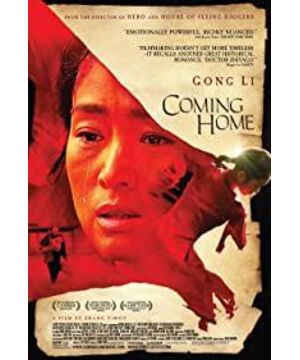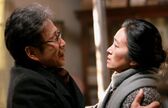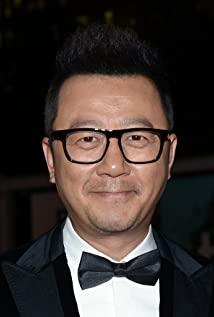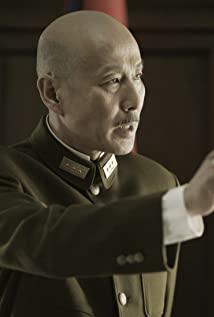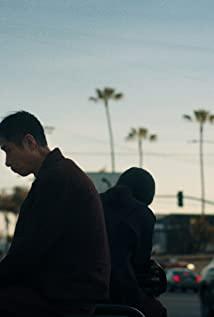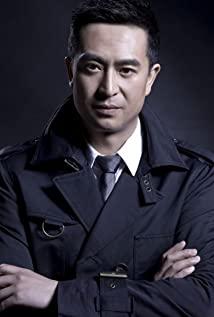"Return" was screened, leaving in enthusiasm and returning with regret.
After the two broke up, I am looking forward to Yimou's first work "Return". Because I think that the main reason why Master Zhang has not had a particularly decent film in recent years is that Master Zhang is involuntary and there is a big trader behind him. Once Master Zhang has a relatively free creative space for art, the one who once shot "Chrysanthemum" Zhang Yimou of "Bean", "Red Sorghum", "The Big Red Lantern", and "If You Have Something to Say" is likely to be back again.
However, facts are often not shifted according to the will of individual expectations.
Let us put aside the distracting thoughts of ideology and only think about "Return" from the art itself.
What story is this, and what film is it?
If we delete the WG era elements in "Return", remove the white legs of dancers that show Master Zhang's preference, remove Lu Yanzhi's accusation, and remove a group of acting celebrities sponsored guest appearances, "Return" can be simplified to (Attention, spoiler.) The story of an old man who has not seen his wife for 20 years, and his wife is sick.
The background of the era can be completely blurred. It is a contemporary play, and the frame of the film is unscathed.
In the story of "Returning", there are no two people in each other, only one person is old. One person lost his memory because of the pain of love, and the other stayed by her side silently all his life.
Ou Kai, this story can be completely indented into a WeChat or a short article on "Military Friend". Why have to spend two hours telling it in a movie? ?
The two leading actors used their thrilling acting skills to cover up a prosaic story.
The question here is that if we are going to talk about a middle-aged and elderly themed art film that is as elegant as tea, will the "catch and escape" conflict in the first 20 minutes of the film be separated from the restless film for more than an hour? This is like an article. The first third is drama, and the last two thirds are changed into reminiscence prose. What is this?
The two protagonists used their meticulous and superb acting skills to win step by step to prop up this movie. Their charm is that as long as you focus on their performance on the big screen, you will be deeply moved by them. His performance is like a sharp arrow, you can easily shoot through your little heart with sympathetic meridians, and then you will sincerely sigh that this movie is really moving.
This matter is at least 108 grades higher than the howling performance in front of the audience in "Tangshan Earthquake". However, this is the actor's business, and the trick is justified. The scene in "Return" is indeed touching, but it is indeed a hollow arrow.
First of all, if a character wants to move people in a drama, first, the audience must be familiar with, recognize and like the character, and then when the character is in trouble or painful or even hangs up, it has the power to break the heart, Lu Xun said The tragedy of China is to destroy the good things, and there must be "goodness" before they are destroyed. This is the truth. For example, the characters in "Infernal Affairs", every character stands, let you remember and like them, and then they hang up one by one, whether it is Du Wenze or Huang Qiusheng, or Zeng Zhiwei and Tony Leung, when each character hangs up, You will feel pain in your heart, and a sense of sadness. You will die when you come up. No one will be moved. Therefore, if you want to play tragedy, you must follow this artistic rule, that is, you must first "set up characters." If there is no such process, the work will show the suffering of the characters, so it is just to win the sympathy of the audience. It is like watching the people suffering in the disaster area. You have never known him. If you see his "miserable", you will also Sad and crying, but this is not drama, let alone art.
"Return" came out as Lu escaped. What kind of character is Lu? Why did you escape? Why did he do something "abnormal"? There is no impact in the drama. It is a fugitive who wants to go home to find a woman to elope. How can the audience establish a sense of identity? At first I saw the trailer and thought it was the story of Song Fanping in "Brothers". As a result, I saw that it was just a person who had escaped from prison and wanted to go home. Nothing else. I served it!
Secondly, the so-called watching a drama, the audience is watching a drama, what is a drama? To put it bluntly, there are incidents and conflicts. For example, Master Chen's work "Farewell My Concubine", an old classmate of Master Zhang, is that there are minor incidents in major events, and the characters are always in conflict with the drama. Only when the drama is fascinating can people be exciting. The two are inseparable. Otherwise, "Return" Chen and Gong used their superb acting skills to make people move, but never in the drama conflict, using the inner pain and sorrow of two vacant characters to ravage the hearts of the audience. This is the victory of the actors. , Not the director’s victory. The director should discover and create the ups and downs of the conflict in the script, and then throw the characters into the conflict to show it, unless the director wants to create a polite and eloquent story to express that this is the normal life that the author understands or Nature.
However, "Return" actually has only one "conflict point", that is, the old lady has amnesia. The old man tried various methods and talked about such a thing for more than an hour, even if we kicked away the element of visibility, "Return" also doesn't seem to want to make a film that is as elegant as tea, because at the back of the film, a new conflict "Master Fang" incident was revealed. What did Master Fang do to Feng Wanyu because of what? Why should such a strong conflict point be mentioned at the end of the film? And all the ins and outs of the incident are mentioned, leaving only an unspent spoon and housewives' roars resounding through the alley. What is the structure and ideological role of this single incident in the whole film? ? ?
Okay, let's get back to the topic. This problem obviously lies with Master Zhang, who has the right to speak in movies.
Perhaps Master Zhang's photography background is the crux of the problem.
Because photography is very important in film creation. It involves not only aesthetics, technology, but also shots and scheduling, as well as the expression of characters' hearts and emotions. Therefore, truly good photography controls almost the quality of every shot.
However, the lens in the eyes of photography is single, and the "higher" part of the director than photography lies in the control and understanding of the plot and theme of the whole scene and the whole movie. To put it bluntly, the director is only at the foundation of drama and literature. It is the decisive force that regulates the story and emotion of the entire film.
Therefore, when Master Zhang relied on the works of the first-rate masters of contemporary Chinese literature without hurting the bones and adapting things, the core of the story is hard, standing and profound, such as "Red Sorghum", "Red Lantern", and "Judou" , Such as the direct remake of "The Golden Armor" of "Thunderstorm", and when Master Zhang was very confident and drastically reformed the literary skeleton to create a script, the weakness of drama and literature became unobstructed, such as today’s "There is no conflicting power". "Return", for example, he may not have considered the theme of "Hero" in depth, so it is not surprising that he made "Ambush on Ten Sides" and "The Hawthorn Tree".
Master Zhang is actually a master of film aesthetics. From the screens and shots of "Hero", "Golden Armor", and "Something to Say", I think it is really awesome. But in film narration, the tension of the story and the creativity of scene scheduling are actually the shortcomings of Master Zhang. In fact, this is the core technical foundation of the director. For example, the subtitles at the end of "Many Years Later..." appear. If you use the changes on a table in the picture, it can also be explained. It is also more "smart" than the direct subtitles, or it starts with the shadows of two people on the ground. , The camera shakes, the two are already old-fashioned, how can it be better than directly subtitles? Therefore, Master Zhang, who understands the picture but does not understand the drama, puts down the two axes of scene and color, it is like an old woman with two guns breaking her arms, which is equivalent to the use of martial arts.
I have said so much, all from the perspective of drama. What are the problems with "Return", but the essence of "Return" has not been mentioned yet.
Let us calmly look at the directivity behind the story.
Lu Yanshi suffered heavy physical and spiritual damage, not to mention the suffering and dangers in "reconstruction". As far as the "family ethics drama" itself is concerned, he suffered years of separation from his family, his wife lost his memory, and his daughter reported... These heartbreaking pains were quietly covered by his unswerving and obsessive love for his wife in the movie "Return." In that crazy and bloody world, he and those humanoid demons who once cruelly and fiercely hurt the body and soul of him and his family, in the ordinary days of the day, the two old men who do not know each other vertically and horizontally. In the tears, there was a quiet, natural and natural reconciliation...
From an artistic point of view, the movie "Return" is just a touching double show by performing artists in a pale story with almost zero plot.
From the perspective of mass communication and acceptance, the movie "Return" is actually a tear-jerking smoke bomb.
Behind the hot tears, the movie and the scars are at peace, remembering and forgetting are conflated, soothing and consoling blood as an alliance, understanding and slaughter are treacherous, what does the huge smoke cover?
Those innocent children in the cinema will never know.
There is meat to follow you
2014-5-12
View more about Coming Home reviews


